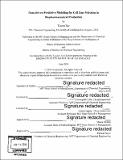Data-driven predictive modeling for cell line selection in biopharmaceutical production
Author(s)
Xie, Yucen,M.B.A.Massachusetts Institute of Technology.
Download1119388527-MIT.pdf (10.92Mb)
Other Contributors
Sloan School of Management.
Massachusetts Institute of Technology. Department of Chemical Engineering.
Leaders for Global Operations Program.
Advisor
Christopher Love and Colin Fogarty.
Terms of use
Metadata
Show full item recordAbstract
A critical component of the biopharmaceutical development cycle is the selection of the cell line that will become the Master Cell Bank for product manufacturing for clinical and commercial use. This cell line selection process is resource-intensive, requiring several months, involving hundreds of cell cultures and corresponding assays, and is largely conducted on a per-experiment basis. Ultimately, a single cell line that can yield product of consistently high quality and titers is selected. In this thesis, we aggregated historical, pre-clinical program data to create analytic tools. We deployed machine learning algorithms to produce insights and provide predictive power for cell line selection in future experiments. Our models reduced prediction errors by 38 - 90% for bioreactor end-point titer and product quality metrics. These interpretable and robust models lead to better knowledge of key attributes affecting titer and product quality as well. Our models are currently deployed as a web-based tool, and pilot studies prove we can generate massively parallel in silico predictions with high accuracy. Ultimately, our project can lead to more productive and higher quality cell lines and reduced development cycle times. Utilizing a modular algorithmic framework, our novel application of machine learning not only delivers efficiency and differentiation in the cell line selection process, but also promotes a scalable and transferable digital platform for analogous applications throughout the biopharmaceutical industry.
Description
Thesis: M.B.A., Massachusetts Institute of Technology, Sloan School of Management, 2019, In conjunction with the Leaders for Global Operations Program at MIT Thesis: S.M., Massachusetts Institute of Technology, Department of Chemical Engineering, 2019, In conjunction with the Leaders for Global Operations Program at MIT Cataloged from PDF version of thesis. Includes bibliographical references (pages 99-105).
Date issued
20192019
Department
Sloan School of Management; Massachusetts Institute of Technology. Department of Chemical Engineering; Leaders for Global Operations ProgramPublisher
Massachusetts Institute of Technology
Keywords
Sloan School of Management., Chemical Engineering., Leaders for Global Operations Program.